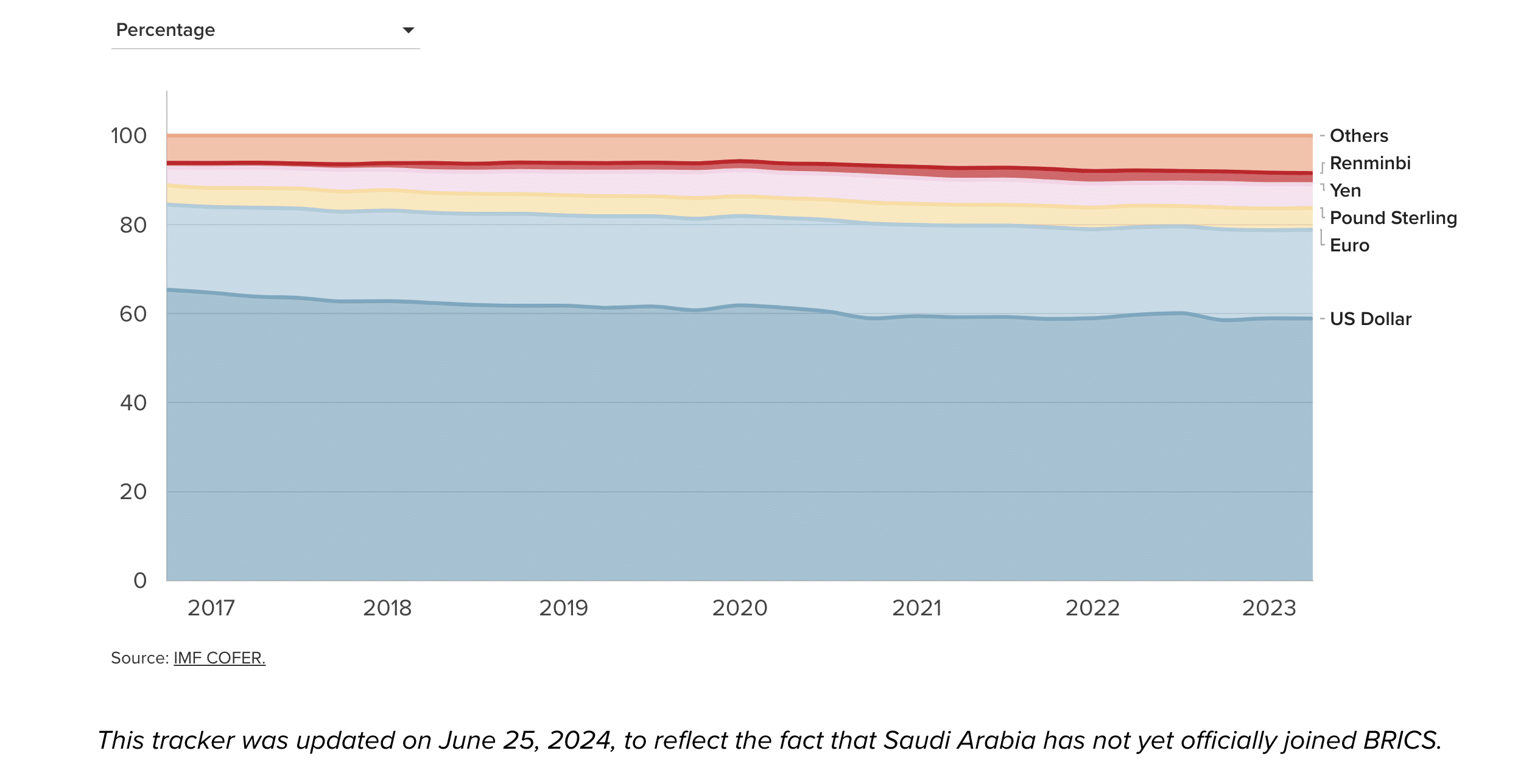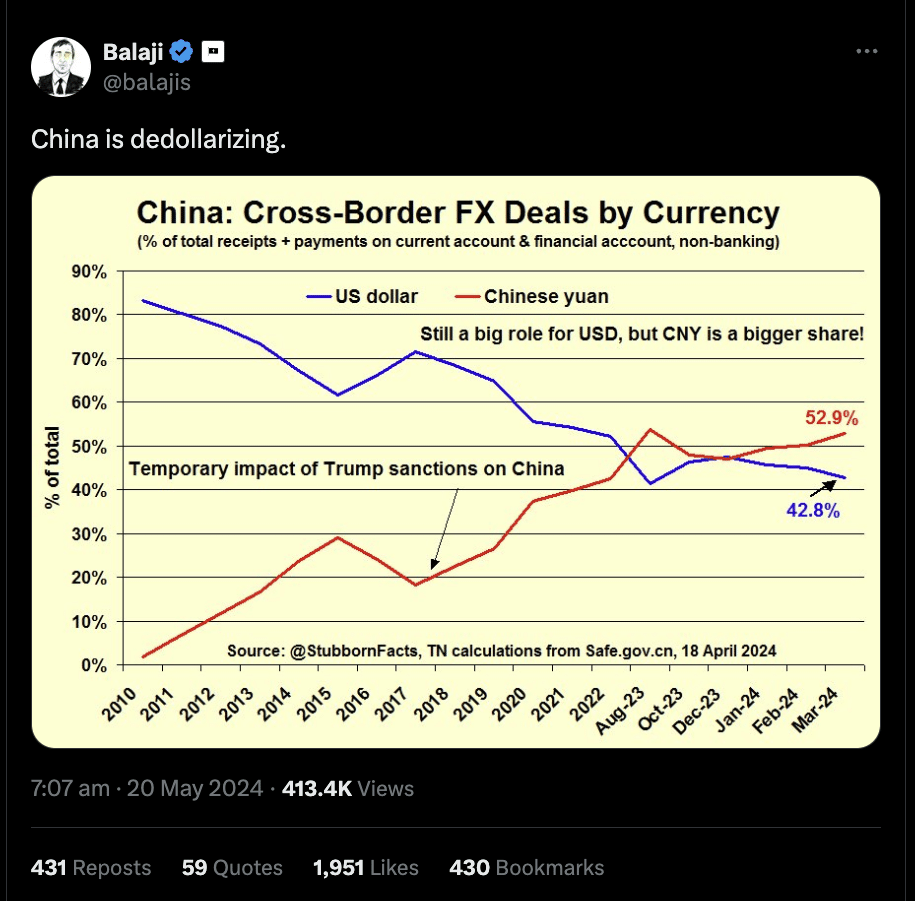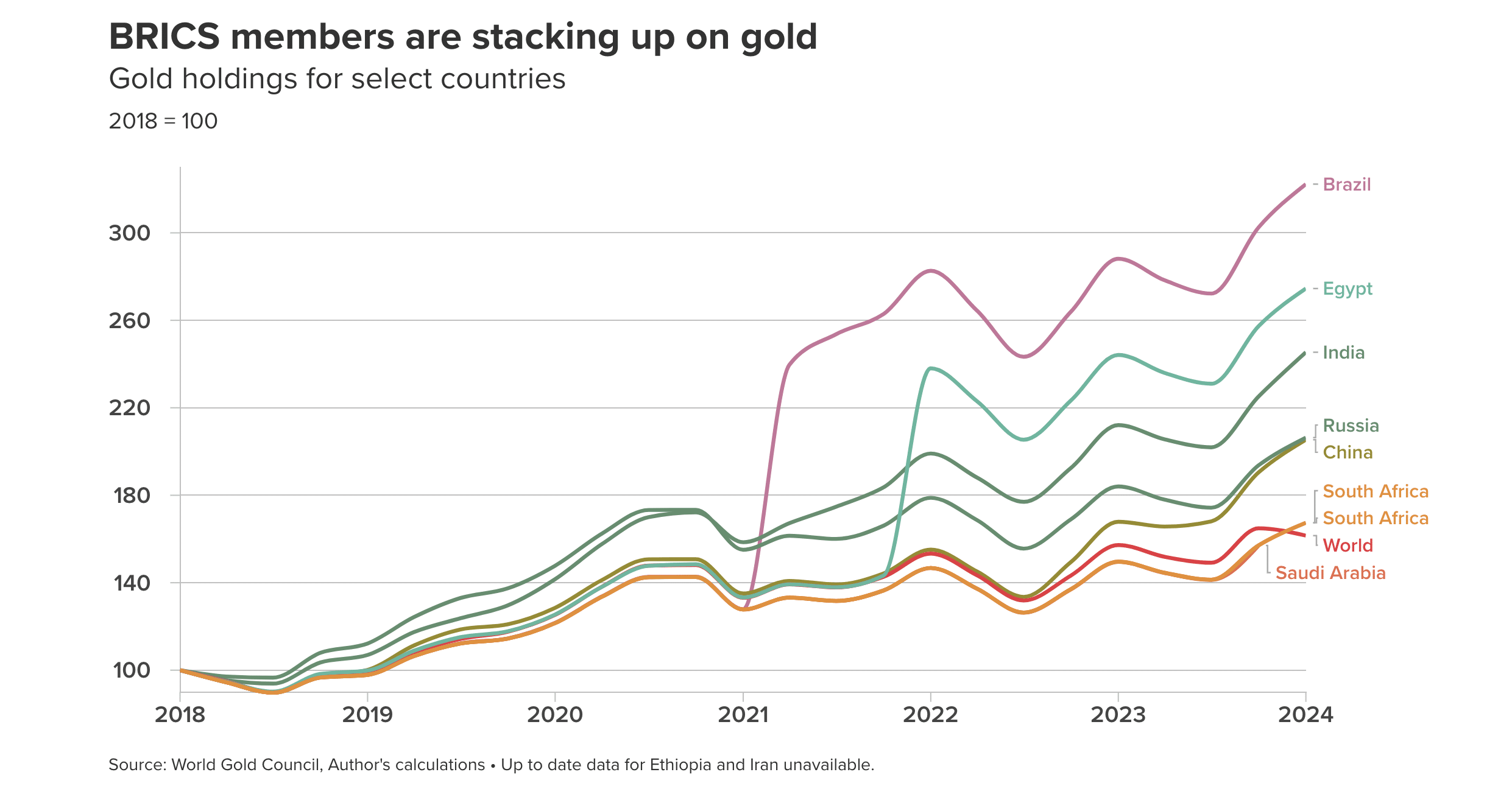- NDB now working towards expanding the use of local currencies to “de-dollarize”
- Bitcoin could be the next big reserve currency
120 foreign countries attended the International Municipal Forum of the BRICS countries a few days ago. On the heels of the same, however, the New Development Bank hosted its 9th Annual Meeting. The latter is in the news today after its President Dilma Rousseff claimed that the NDB is working towards expanding the use of local currencies. In other words, the NDB is working towards de-dollarization.
Hence, the question – What does this mean for Bitcoin?
According to Rousseff,
“One of the main focuses of the NDB is to increase the use of local currencies. We have decided that up to 30 per cent of the bank’s total funding will take place in local currencies”
An international movement?
BRICS has been front and center of this de-dollarization movement over the past few years. In fact, during the 15th Annual Summit of the BRICS countries last year, there was much support for a singular “BRICS currency.” At the time, Brazil’s President Lula Da Silva said,
“It increases our payment options and reduces our vulnerabilities.”
Here, it’s worth pointing out that most of the world is still far from de-dollarization. According to the Atlantic Council’s Dollar Dominance Monitor, for instance, the US Dollar still accounts for a 58% share of all global forex reserves. Similarly, it has a share of 88% across all foreign exchange transactions.

Source: Atlantic Council
Simply put, de-dollarization won’t happen in the short term or the medium term. This, despite the fact that to China’s credit, it has steadily been de-dollarizing itself.

Source: X
On the contrary, it could happen in the long term. Especially since the USD’s share of all global foreign reserves has fallen from 65.3% to 58.8% in the last 8 years alone. Similarly, many countries, especially those associated with BRICS, have been accumulating gold despite rising prices.

Source: Atlantic Council
Gold’s status as a reserve and as a store of value has risen since 2019, especially since the COVID-19 pandemic. Subsequently, there has been great interest in other asset classes that have store of value characteristics too. Bitcoin and cryptocurrencies in general, are now seen as one such asset class.
Bitcoin to the rescue?
Russia and Iran, for instance, are already using Bitcoin and Bitcoin mining to mitigate the effects of international sanctions imposed against them. In fact, the former is also beta testing cryptocurrency exchanges to assess how cross-border crypto transactions will work.
As an organization too, BRICS has been keen on launching a gold-backed stablecoin, especially on the back of its previous discussions about a “BRICS currency.”
Outside of these interests, there is also great interest among many countries to go El Salvador’s way and accumulate Bitcoin as a treasury asset. President Bukele, when he announced this step back in 2021, also intended to “de-dollarize” the economy, despite criticism from the World Bank and IMF.
2024 is a different world, however, with major institutions like MicroStrategy and Metaplanet also diving into cryptocurrencies. That’s not all either, as Bitcoin and Ethereum ETFs are now among the most popular on Wall Street – A sign of institutional interest in this asset class.
All these developments, together, mean that crypto is awaiting the next big leg up. If BRICS countries are successful in their effort to de-dollarize and if even a minor percentage of the USD’s liquidity is directed towards cryptos, the market might change forever.
- NDB now working towards expanding the use of local currencies to “de-dollarize”
- Bitcoin could be the next big reserve currency
120 foreign countries attended the International Municipal Forum of the BRICS countries a few days ago. On the heels of the same, however, the New Development Bank hosted its 9th Annual Meeting. The latter is in the news today after its President Dilma Rousseff claimed that the NDB is working towards expanding the use of local currencies. In other words, the NDB is working towards de-dollarization.
Hence, the question – What does this mean for Bitcoin?
According to Rousseff,
“One of the main focuses of the NDB is to increase the use of local currencies. We have decided that up to 30 per cent of the bank’s total funding will take place in local currencies”
An international movement?
BRICS has been front and center of this de-dollarization movement over the past few years. In fact, during the 15th Annual Summit of the BRICS countries last year, there was much support for a singular “BRICS currency.” At the time, Brazil’s President Lula Da Silva said,
“It increases our payment options and reduces our vulnerabilities.”
Here, it’s worth pointing out that most of the world is still far from de-dollarization. According to the Atlantic Council’s Dollar Dominance Monitor, for instance, the US Dollar still accounts for a 58% share of all global forex reserves. Similarly, it has a share of 88% across all foreign exchange transactions.

Source: Atlantic Council
Simply put, de-dollarization won’t happen in the short term or the medium term. This, despite the fact that to China’s credit, it has steadily been de-dollarizing itself.

Source: X
On the contrary, it could happen in the long term. Especially since the USD’s share of all global foreign reserves has fallen from 65.3% to 58.8% in the last 8 years alone. Similarly, many countries, especially those associated with BRICS, have been accumulating gold despite rising prices.

Source: Atlantic Council
Gold’s status as a reserve and as a store of value has risen since 2019, especially since the COVID-19 pandemic. Subsequently, there has been great interest in other asset classes that have store of value characteristics too. Bitcoin and cryptocurrencies in general, are now seen as one such asset class.
Bitcoin to the rescue?
Russia and Iran, for instance, are already using Bitcoin and Bitcoin mining to mitigate the effects of international sanctions imposed against them. In fact, the former is also beta testing cryptocurrency exchanges to assess how cross-border crypto transactions will work.
As an organization too, BRICS has been keen on launching a gold-backed stablecoin, especially on the back of its previous discussions about a “BRICS currency.”
Outside of these interests, there is also great interest among many countries to go El Salvador’s way and accumulate Bitcoin as a treasury asset. President Bukele, when he announced this step back in 2021, also intended to “de-dollarize” the economy, despite criticism from the World Bank and IMF.
2024 is a different world, however, with major institutions like MicroStrategy and Metaplanet also diving into cryptocurrencies. That’s not all either, as Bitcoin and Ethereum ETFs are now among the most popular on Wall Street – A sign of institutional interest in this asset class.
All these developments, together, mean that crypto is awaiting the next big leg up. If BRICS countries are successful in their effort to de-dollarize and if even a minor percentage of the USD’s liquidity is directed towards cryptos, the market might change forever.














































































